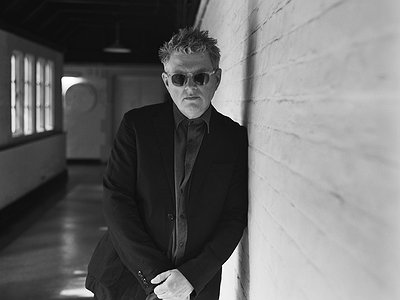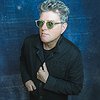Collaborations can take on many forms. What role do they play in your approach and what are your preferred ways of engaging with other creatives through, for example, file sharing, jamming or just talking about ideas?
I love working on my own, but collaboration is exciting in a different way. People say that, in a game of chess, or tennis, if you only play people you can beat then you will never improve your game. It’s the same with music, but because we all have strengths and weaknesses in different areas, there is always something to give and take from collaboration. For me, the best form of collaboration is found in playing together because it gets me away from my personal obsessions. This can occur in scored performance as much as improvised forms. I think that might be something to do with surrendering the ego for a moment in order to achieve a higher purpose. It’s such a relief to be engaged with something more important than the self. It also offers a glimpse of the almost mystical aspect of music as a form of meditation and a release from thought patterns.
Could you take us through a day in your life, from a possible morning routine through to your work? Do you have a fixed schedule? How do music and other aspects of your life feed back into each other - do you separate them or instead try to make them blend seamlessly?
I’m amazed that, after forty odd years of making music, I still wake up each day and want to do more. There are some who advise keeping music as a hobby, but they totally underestimate its importance in everything from grand cultural effects to the neurological activity it brings to an individual musician or listener. I’m just about as eclectic as it’s possible to be, but music and sound have become the most prominent activity in everything I do.
Could you describe your creative process on the basis of a piece or album that's particularly dear to you, please? Where did the ideas come from, how were they transformed in your mind, what did you start with and how do you refine these beginnings into the finished work of art?
There is one thing which I have noticed recently. I often have to go through a stage of extreme complexity in order to find a simple solution. This comes up in so many ways, but a common one is just putting way too many parts in the arrangement of a piece, simply because it’s possible. So I will often build up the complexity until it’s at a straining point, often just before mixing, then try ruthlessly clearing out anything non-essential. It often pays off dramatically, but it’s strange to think that the things you edit out were a necessary part of the process, even though they don’t make the final cut. This makes an odd twist on the questions about which comes first, words or music, because sometime the starting point of an idea is lost in the process. So I’ve learned to accept that it’s necessary for me to indulge a kind of maximalism in order to discover the minimalism within it. I would say that all the songs on my new record went through this overgrowth and pruning process.
There are many descriptions of the ideal state of mind for being creative. What is it like for you? What supports this ideal state of mind and what are distractions? Are there strategies to enter into this state more easily?
This really seems to be a question about life in general. If the distance between what we know to be true and the way we behave is too great, then a cognitive dissonance results. This is perhaps especially true of the arts. When asked the philosophical question “How does one paint the perfect picture?” Robert Pirsig answered: “Become perfect, then paint a picture.” But we are complicated organisms and such ideals seem unattainable. However, we all know that a kind of alert but relaxed state of mind is best - and that, in turn, relies on balance and energy, which rest on the tripod on health, nutrition and rest. Unfortunately, for most of us, these things only come with a certain amount of self-discipline. There’s no shortcut to an ideal state of mind. And there are many extremely gifted musicians whose best work seems to elude them for lack of this self-control.
How is playing live and writing music in the studio connected? What do you achieve and draw from each experience personally? How do you see the relationship between improvisation and composition in this regard?
We have perhaps mistakenly overemphasised these distinctions. These areas inform each other constantly. Years ago, I realised that mixing a track could be experienced as a kind of performance ... or that programming a computer, if you’re “in the zone”, feels in some ways like free-jazz improvisation. So maybe that is the more important thing: to respect and pursue this kind of state of grace in which the creative process flows freely. It probably has several preconditions but, with experience, we can recognise some familiar signposts on the way. It can also turn up by surprise.
How do you see the relationship between the 'sound' aspects of music and the 'composition' aspects? How do you work with sound and timbre to meet certain production ideas and in which way can certain sounds already take on compositional qualities?
I have always had a powerful response to the way notes go together rather than the way they sound - so much so that I can listen to an 8-bit arcade style rendition of the opening of St Matthews Passion and still be brought to tears. I don’t really understand why that happens. But the moment of experiencing an enlightening new sound is purely magical too. That’s partly why synthesisers have such an effect on us.
Our sense of hearing shares intriguing connections to other senses. From your experience, what are some of the most inspiring overlaps between different senses - and what do they tell us about the way our senses work? What happens to sound at its outermost borders?
I know people who are deeply synesthetic and they have a fascinatingly different take on these things. But I like to think that all hearing has the potential to lead us inside ourselves. If art is ultimately about self-knowledge, then the melody must turn away from the senses and become further internalised in order to achieve this. In this way it become less about hearing with the ears and more about listening to an internal sound. Incidentally, there are great mystical traditions teaching this. It’s perhaps strange that no one has ever asked me about this before, but it’s a powerful and personal way of dealing with the connection.
Art can be a purpose in its own right, but it can also directly feed back into everyday life, take on a social and political role and lead to more engagement. Can you describe your approach to art and being an artist?
Culturally speaking, all art takes meaning from context. Some level of political activism is required of us all - and thinking specifically about rock’n’roll and pop, the music takes on its great purpose when it targets some kind of social change. That’s the reason I found it so irresistible as a teenager: it felt like the perfect way to say “we don’t accept the way the world is …. we can do better and nothing can stop us” But there are signs that the uncontrolled rebelliousness has now been contained by the corporatisation of the message. Gestures which once had real power and meaning are now used symbolically/cynically as marketing techniques. This is a big question, but I do miss the question, the threat, which used to be implied by most of what we heard. Perhaps the vitality of that relationship has moved to another area of cultural interaction, like the internet.
It is remarkable, in a way that we have arrived in the 21st century with the basic concept of music still intact. Do you have a vision of music, an idea of what music could be beyond its current form?
I have an unreleased project which relies on social co-operation in order to be heard. I hope to work on that later this year.



